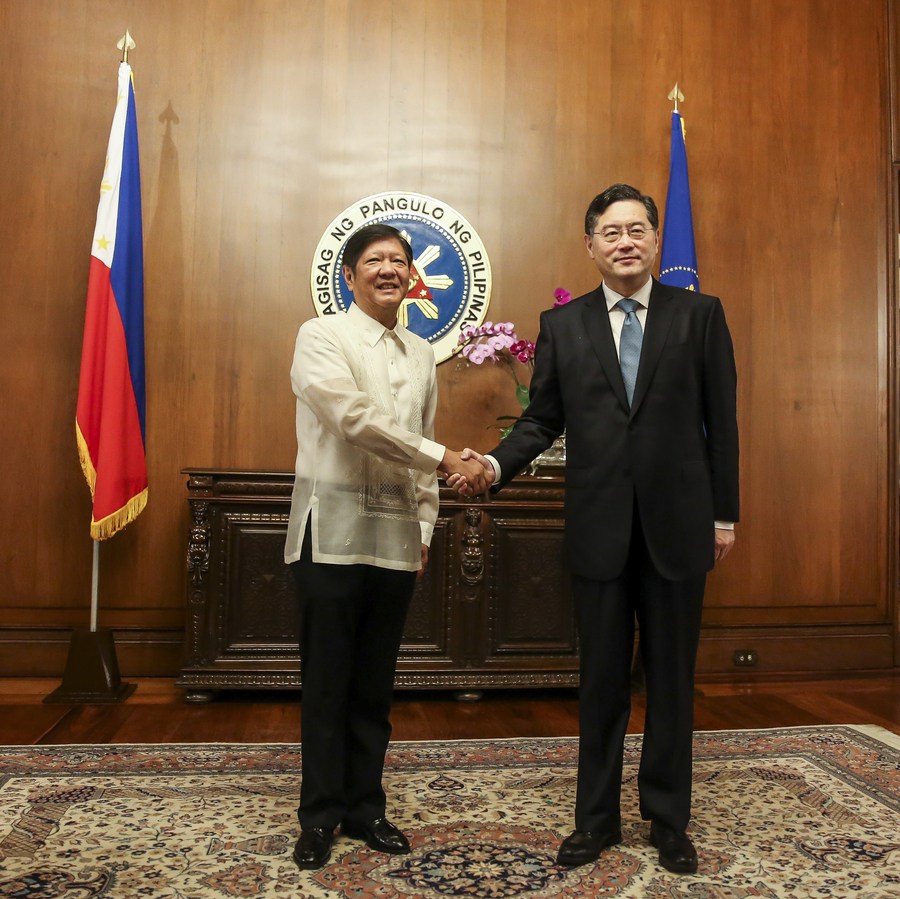Philippines urged to respect 'one China'

Philippine President Ferdinand Romualdez Marcos (L) meets with Chinese State Councilor and Foreign Minister Qin Gang in Manila, the Philippines, on April 22, 2023. [Photo/Xinhua]
Beijing urged Manila to properly handle the Taiwan question and maritime issues, and "substantially respond to China's justified concerns" during State Councilor and Foreign Minister Qin Gang's just-concluded visit to the Philippines.
Qin's visit, from Friday through Sunday, incorporated meetings with several prominent political leaders, including Philippine President Ferdinand Romualdez Marcos Jr.
The United States' reinforced military collaboration with the Philippines and its attempts to involve Manila deeper in the China-US tension on the Taiwan question have cast a shadow over the ties between China and the Philippines, analysts said.
Issues such as the Taiwan question and maritime concerns were high on the agenda, and Qin urged the Philippines to "respect China's sovereignty, security and territorial integrity".
Observers said that Qin's visit and comments made by both sides underline the countries' willingness to keep the China-Philippines relations afloat.
During their meeting on Saturday, Marcos told Qin that the Taiwan question is part of China's internal affairs, and the Philippines will, as always, stay committed to the one-China policy.
Manila will continue to subscribe to self-reliance, being independent and not taking sides, and it is willing to deepen its friendship with Beijing, expand collaboration and strengthen communication, Marcos said.
The Philippines will also properly handle maritime issues, prevent them from disturbing the bigger picture of bilateral ties and champion peace and prosperity in the region, he added.
Qin noted that the two sides are "faced with a new situation and fresh challenges", according to an official readout from the Foreign Ministry.
Both sides are expected to stay true to the right path in their relations, "embark on in-depth communication, boost mutual trust, overcome difficulties, rule out disturbances, create good conditions for advancing cooperation", and ensure that the ties move forward on the right track in a sound and stable manner, Qin said.
Marcos recalled that he had accompanied his father, then Philippine president Ferdinand Marcos, to China 48 years ago when the right decision was made to establish the two nations' diplomatic ties. He called it "a great legacy".
Qin said all developments that have taken place since the ties were established show that mutual trust, friendly coexistence, subscription to credibility and justice and win-win cooperation "serve the fundamental interests of both sides".
Beijing expects Manila to properly perceive the trend of history, act on the region's bigger picture of peace and stability, and work for the fundamental interests of the people of both countries, he said. Successful and painful experiences both offer lessons to learn from, he added.
In January, following Marcos' first state visit to China as Philippine president, the two countries issued a joint statement that described the nations as "close neighbors, kin and partners". Qin said that Manila is expected to work with Beijing to "realize this great hope".
Zhang Lili, professor and director of the Center of Chinese Diplomacy Studies at China Foreign Affairs University, said Qin's visit shows that "China's official position and policy remains unchanged when it comes to developing friendly ties with the Philippine government and people".
"Although Washington has been energetically meddling in East Asia affairs and has recently intensified its interference in affairs related to the Philippines to a great extent, Beijing sincerely hopes that China and the Philippines remain good neighbors, partners and friends," Zhang said.
The reunification of China is an unstoppable trend, and "the Philippines should be careful on the Taiwan question, avoid taking a wrong side over this matter and falling into the trap set up by the US", Zhang added.
Chen Xiangmiao, an associate research fellow at the National Institute for South China Sea Studies, said the two sides should "intensify their efforts in preventing their relations from falling prey to the US' strategies in Southeast Asia and the 'Indo-Pacific Strategy' ".
Currently, Sino-Philippine ties are at a critical phase of developing into a comprehensive strategic partnership, and the two countries need more top-level discussions and could consider building a strategic dialogue mechanism, Chen said.
"They should further prioritize proper tackling of maritime disputes and build more trust in military and defense areas," he added.
Photos
Related Stories
Copyright © 2023 People's Daily Online. All Rights Reserved.









